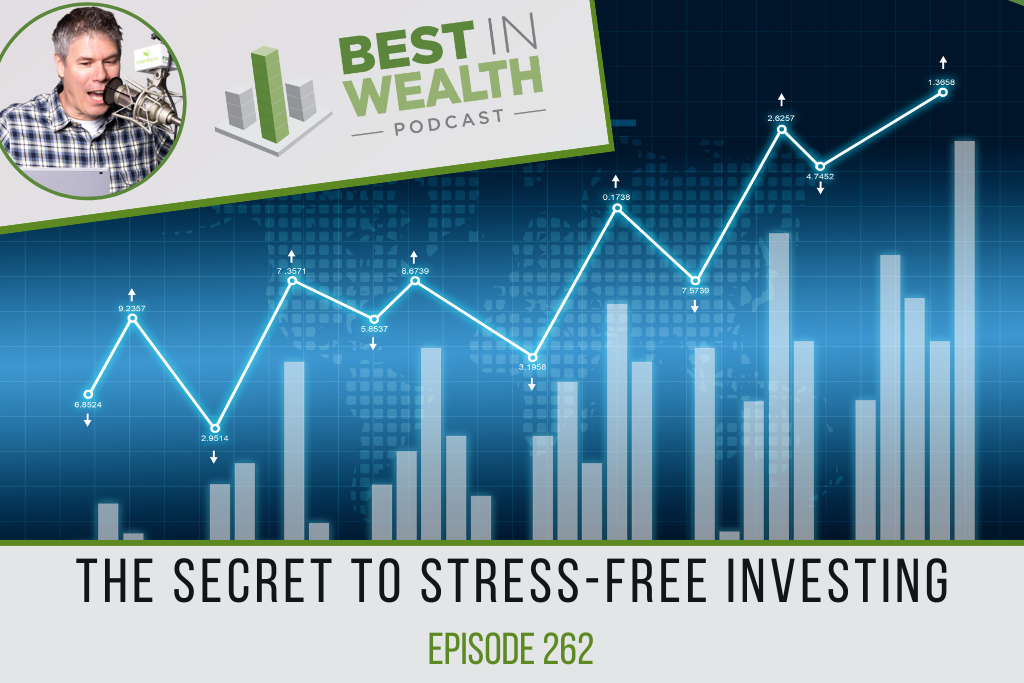The Secret to Stress-Free Investing, Ep #262

We all have some worries, those everyday anxieties that creep into our lives—money, kids, jobs, and adding more stress to your life in the form of an investment portfolio can seem like too much at times.
So this week, I am sharing how understanding one key financial theory can transform your approach to investing and seriously lower your stress.
This episode takes you through the groundbreaking work of Eugene Fama and the efficient market hypothesis, explaining why trying to outguess the market is usually a losing game.
I am also sharing how, by trusting the power of the market and building your strategy around solid, evidence-based principles, you can ditch investing anxiety and set your family up for long-term success.
So if market swings keep you up at night or you are looking for a more peaceful way to manage your portfolio, tune in for a fresh perspective and actionable advice on taking the stress out of investing—once and for all.
Outline of This Episode
- [00:00] Your foundation of knowledge to experience stress-free investing.
- [05:58] Understanding Efficient Market Hypothesis (EMH).
- [09:40] The power of market consensus.
- [11:55] How fast does the stock market react?
- [13:12] Efficient market hypothesis simplified.
- [17:27] The myth of market-beating funds.
- [19:22] Reduce investment stress by demystifying the market.
Does Investing Have to Be One More Worry?
Retirement account fluctuations, big market drops like those in 2008, COVID-19, and trade war-related selloffs are enough to send anyone’s blood pressure soaring. One of the most important concepts in modern finance: the Efficient Market Hypothesis (EMH), developed by Nobel laureate Eugene Fama.
In simple terms, the EMH says that all the available information about any publicly traded company is already reflected in its stock price. Let’s use Apple as an example. Every day, millions of shares, worth billions of dollars, change hands, each trade representing someone who thinks Apple is fairly priced, and someone else who disagrees.
Crucially, both buyers and sellers have access to the same information. No one has a crystal ball; everyone’s predictions about future sales and profits are just that—educated guesses.
Why Beating the Market Is So Hard
In a 20-year analysis of actively managed mutual funds, those run by managers trying to beat the market through skillful stock picking. Of the 1,667 funds analyzed on January 1, 2004, just 48% were still around 20 years later (the rest closed or merged after poor performance).
Of those survivors, only 16% managed to outperform the market—a sliver of winners, and no guarantee that their outperformance was due to skill rather than luck. Over longer periods, the odds get even worse. The market’s efficiency means that news, good or bad, gets priced in fast.
By the time you read about a hot tip or see a magazine headline, it is almost certainly too late to profit.
Building a Stress-Free Investment Philosophy
Adopting the efficient market approach means basing your investment strategy not on predictions, but on accepting that prices already reflect what is knowable. This data and science-driven approach is the bedrock for stress-free investing.
When you stop believing you or a mutual fund manager can consistently outguess millions of other market participants, everything changes:
- Daily fluctuations stop feeling like emergencies.
- Your plan is not derailed by shocking news or downturns.
- Emotional decision-making is replaced by disciplined adherence to your long-term strategy.
This knowledge leads to better results, as you avoid the pitfalls and fees of chasing “winners” and trying to time the market.
The goal is not just to match the market, but to give you the greatest chance for success. By using low-cost investment tools that are aligned with the efficient market hypothesis (like broadly diversified index funds), you maximize your odds of building lasting family wealth—without sleepless nights.
When you understand and embrace the efficient market hypothesis, the mystique and the stress of the market fades away. Investing becomes a rational, controlled process anchored in decades of evidence, not hunches.
Resources Mentioned
Connect With Scott Wellens
- Schedule a discovery call with Scott
- Send a message to Scott
- Visit Fortress Planning Group
- Connect with Scott on LinkedIn
- Follow Scott on Twitter
- Fortress Planning Group on Facebook
Podcast Disclaimer:
The Best In Wealth Podcast is hosted by Scott Wellens. Scott Wellens is the principal at Fortress Planning Group. Fortress Planning Group is a registered investment advisory firm regulated by the US Securities and Exchange Commission in accordance and compliance with securities laws and regulations. Fortress Planning Group does not render or offer to render personalized investment or tax advice through the Best In Wealth Podcast. The information provided is for informational purposes only and does not constitute financial, tax, investment or legal advice.
Audio Production and Show Notes by
PODCAST FAST TRACK
https://www.podcastfasttrack.com



